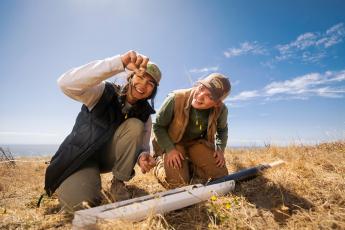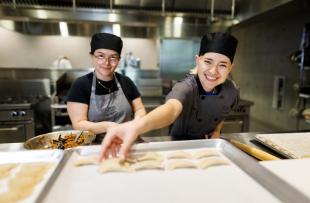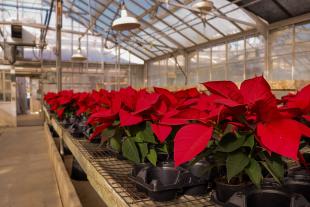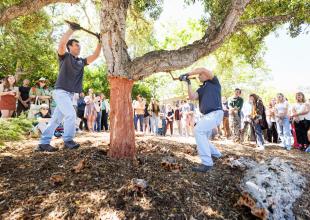Professors Awarded a $200,000 Healthy Soils State Grant

An interdisciplinary team of Cal Poly professors and Central Coast vineyards have been awarded a three-year $200,000 grant from the California Department of Food and Agriculture Healthy Soils Program to demonstrate the potential for vineyard soils to capture and store carbon through the use of appropriate land management practices.
Cristina Lazcano and Charlotte Decock, assistant professors in the Natural Resources Management and Environmental Sciences Department, will lead the research team in studying the effects of compost application and no-till methods on soil carbon and greenhouse gas emissions relevant to the production of wine grapes on the Central Coast.
The Healthy Soils Demonstration Project was inspired by Cal Poly’s industry partners, who are seeking information about the benefits of management practices for soil health.
“The wine industry wants to better understand soil management practices and the impacts on the environment,” Lazcano said. “Industry representatives came to us with this request, and we found a way to help them.”
Cal Poly’s Center for Sustainability, the Horticulture and Crop Science Department, and the Wine and Viticulture Department are collaborating with the Natural Resources Management and Environmental Sciences Department on the research, which will take place over a three-year period at two vineyards in Paso Robles: J. Lohr Vineyard and Tablas Creek Vineyard. The grant is part of California’s Healthy Soils Initiative, which seeks to promote the development of healthy soils.
Two graduate students will help oversee the research, Lazcano said, and undergraduates will also be given the opportunity to assist. Soil measurements will begin early this year, and that data will be processed at year’s end. Lazcano and her Cal Poly partners will hold seminars and various field days to share the results once they are available. “Outreach and dissemination of information we obtain is a high priority,” Lazcano said.
J. Lohr Vineyard will serve as the demonstration site for composting practices, and Tablas Creek Vineyard will be the demonstration site for no-till practices. Agricultural professionals will be invited to take part in demonstration field days at these participating vineyards beginning in fall 2018. Information about these field days and other soil health initiatives will be available at the Center for Sustainability website at http://cfs.calpoly.edu/.



